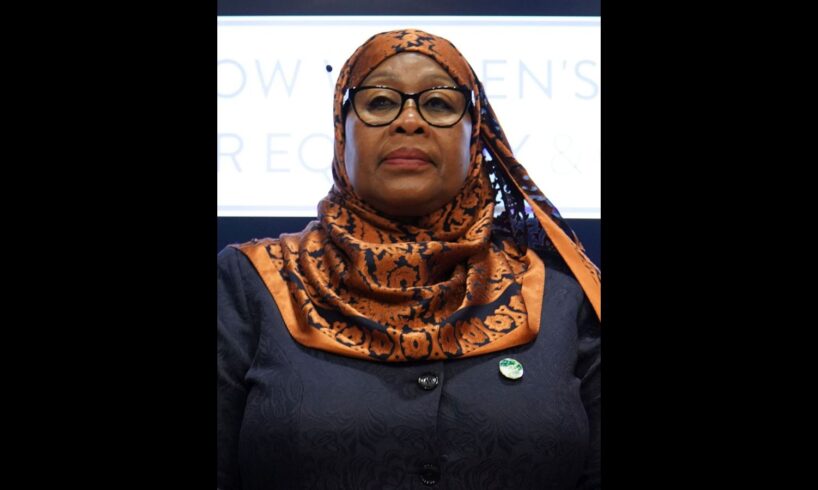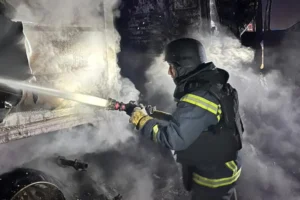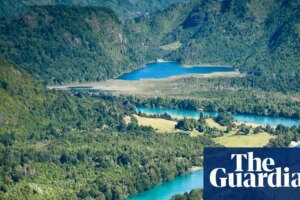
Behind the walls of a heavily guarded military compound in Dodoma, President Samia Suluhu Hassan took the oath of president following a fraudulent election, organised by the ruling Chama Cha Mapinduzi (CCM) regime to continue its sixty-four years in power.
Monday’s ceremony, held under tight military control, unfolded in an atmosphere of fear. In Dar es Salaam, petrol stations and grocery shops were shut and the streets almost empty, while in Dodoma, most residents stayed indoors. Schools and colleges across the country closed, public transport was suspended, and even church services were cancelled. The event was broadcast live by the state-run Tanzania Broadcasting Corporation, the only media outlet allowed to cover it. The public was excluded, and internet and social media access were cut nationwide.
President of Tanzania Samia Suluhu Hassan [Photo by Scottish Government / CC BY 2.0]
The extraordinary security measures were an attempt to project an image of stability by a deeply isolated ruling class clinging to power through police-state violence. The state was reeling from four days of unprecedented nationwide protests that had developed into a mass popular uprising. Hundreds of thousands, if not millions, of workers, youth, and the unemployed defied curfews, army patrols, and live ammunition to reject the stolen election.
Loading Tweet …
Sixteen “opposition candidates” attended the ceremony, another demonstration that they were never more than a fig leaf of opposition cultivated by CCM to legitimise a fraudulent process that supposedly produced a 98 percent vote for Hassan.
Absent was the main opposition party, the pro-business CHADEMA led by Tundu Lissu, who remains imprisoned on fabricated treason charges.
Only four African leaders attended the ceremony: Daniel Chapo of Mozambique, Hakainde Hichilema of Zambia, Évariste Ndayishimiye of Burundi, and Hassan Sheikh Mohamud of Somalia, each presiding over brutal dictatorships. Like Hassan, Chapo’s FRELIMO government, in power for fifty years, rigged the 2024 elections and crushed mass protests, killing over 400 people and arresting more than 7,000.
The inauguration took place with the streets of major cities still stained with blood. As internet services gradually return following a six-day shutdown, reports are surfacing of mass killings. CHADEMA estimates that more than 1,000 people have been killed. Diplomatic sources told the BBC of at least 500 deaths. Charles Kitima, secretary general of the Tanzania Episcopal Conference which has long backed the regime, acknowledged that “hundreds” had died, citing reports from communities across the country.
On Tuesday, CHADEMA spokesperson Brenda Rupia said that the security forces “are holding dead bodies” and that the remains of victims were being secretly dumped to hide the scale of the killings.
Horrific accounts continue to emerge despite regime threats against anyone sharing images or videos on social media deemed to “cause panic,” warnings that doing so could amount to treason, a charge carrying the death penalty.
Loading Tweet …
In Dar es Salaam’s Temeke district, a resident told Human Rights Watch that her neighbour, who had not taken part in the protests, was shot and killed outside his home by a man in civilian clothes. Another resident, speaking anonymously to Reuters for fear of reprisal, said a family member was shot dead outside a hospital after being mistaken for a protester.
A football agency, Viral Scout Management, confirmed that seven of their players between 15 and 22 had been killed, including Rajabu Rajab (17), Anthony Rico (18), Abdulqareem Ali (16), Peter Eliya (19), Mshani Musa (17), Omar Musa (15), and John Hosea (22), in Mbeya, Dar es Salaam and Mwanza.
A Kenyan teacher, John Okoth Ogutu, who had been living and working in Tanzania for eight years, was shot and killed in Ubungo on October 29.
Hassan has sought to blame the uprising on “foreign agents”. Speaking during her coronation, she claimed that “some of those arrested for causing disturbances came from outside the country” and vowed that security forces would “restore peace.”
These claims are entirely unfounded. They target Kenyans and other East Africans in a bid to whip up xenophobia and distract from the fact that the protests were led by Tanzanians themselves, driven by massive poverty, inequality and state violence. Kenyan media has reported that Tanzanian security forces are now explicitly targeting Kenyans. The Standard observed:
“Severe measures will be taken,” the police statement warned […]. For hundreds of Kenyans and East Africans living and working in Tanzania, the message was unmistakable that they were the target. The directive was followed within hours by increased police presence on highways and at all major border posts. Monday evening, security forces mounted additional roadblocks and intensified surveillance at crossings including Namanga, Holili and Lungalunga–Hororo, effectively sealing off escape routes for those trying to flee.
Hassan’s accusations mirror the propaganda deployed by Kenyan President William Ruto during last year’s mass demonstrations. As millions of youth and workers took to the streets against International Monetary Fund (IMF) dictated austerity, tax hikes, and police killings, Ruto claimed the protests were orchestrated by the Ford Foundation. “We ask the Ford Foundation to explain to Kenyans its role in the recent protests. We will call out all those who are bent on rolling back hard won democracy,” Ruto declared as he gunned down protestors. The claim was absurd and no evidence has ever been produced to support it.
Despite the attempt to whip up anti-Kenyan sentiment, Hassan is not in conflict with Ruto. She is working alongside him. Across East Africa, the regimes of Kenya, Uganda and Tanzania are coordinating repression and sharing security operations against opponents.
In Uganda, two Kenyan human rights activists, Bob Njagi and Nicholas Oyoo, were abducted while attending Bobi Wine’s campaign event. Their whereabouts remain unknown, and the Ruto government has maintained a deliberate silence. Last year, Ugandan opposition figure Kizza Besigye was kidnapped in Nairobi with Kenyan involvement and later appeared before a Ugandan military tribunal accused of treason. Exiled Tanzanian activist Maria Sarungi Tsehai was seized in Nairobi, choked and interrogated by armed men demanding access to her phone. Kenyan activists who travelled to Tanzania in solidarity with CHADEMA’s leader Tundu Lissu were detained, subjected to sexual abuse and deported.
This developing security alliance recalls Operation Condor in Latin America in the 1970s, when US-backed dictatorships coordinated to suppress, kidnap and eliminate opponents across borders. Confronted with rising unemployment, a burgeoning urban youth population and IMF imposed austerity that has made life intolerable for millions, the fear of the stooges of imperialism is not of “foreign interference” but of workers starting to see that their struggle transcend colonial borders.
Washington, London, Brussels and Ottawa issued carefully worded statements of “concern” over the killings and the six-day internet blackout. Their real priority is to safeguard profits, trade corridors and resource concessions.
Tanzania’s Dar es Salaam port is a strategic hub for the export of minerals, agricultural goods, oil and gas, and serves as a transit artery for Zambia, the Congo, Rwanda, Burundi, Malawi and Uganda. Roughly 70 percent of the port’s transit cargo is destined for neighboring countries, amounting to nearly a quarter of total throughput. Shell, Equinor and ExxonMobil are also vying for control of offshore gas and LNG export infrastructure central to Western energy interests, their war against Russia in Ukraine and preparations for war against China.
An aerial view of Dar es Salaam Port [Photo by Prof. Chen Hualin / CC BY-SA 4.0]
This is the real map of class struggle now taking shape. The Tanzanian working class has shown extraordinary courage in confronting state repression. Their struggle reverberates in Nairobi, Kampala, Kigali and Lusaka. The fight against dictatorship and exploitation cannot be won within national boundaries. It requires the unified, international mobilisation of the working class on a socialist programme, directed against imperialism and the local elites who uphold it.
The future of East and Central Africa lies not in the rival national security states, but in the fight for a United Socialist States of Africa.
Sign up for the WSWS email newsletter





